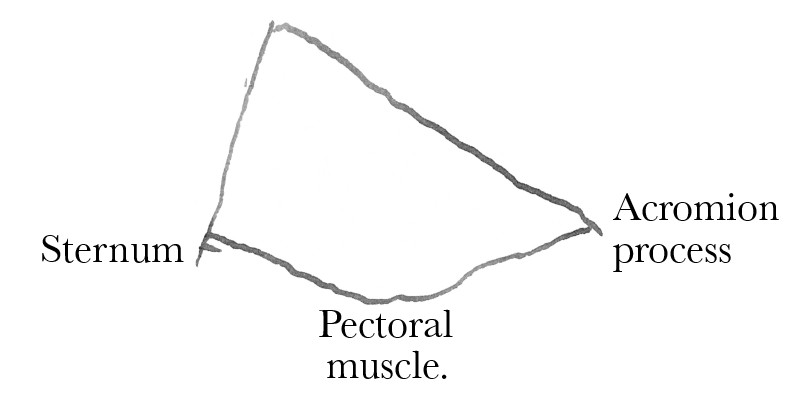From Charles Langstaff 3 May 1871
May 3rd. 1871
—[Mudley] was placed upon the Table in order to have his leg removed owing to disease of the Bones & Arch Joint. He was put under the influence of Chloroform & after the administration had been proceeded with the usual rigidity of the Voluntary Muscles took place. At this moment & during the whole time that the rigidity lasted the skin on the sides of the neck was thrown into transverse folds from the jaw down to the Clavicle & on feeling these folds a sensation of tightness & rigidity, as of something contracting underneath was given to the fingers. I have no doubt now that this was due to the action of the Platysma, & this opinion was most satisfactorily confirmed on the same day in a subsequent operation which I performed on a Girl named Bridget Stockley.1
She had been suffering for 12 years from a horrid Growth, which had latterly increased very much, & now occupied a site which might be described as enclosed by a line running from the centre of the Sternum downwards & outwards over the Pectoral Muscle to within three inches of the Ascilia, and then continuing backwards & upwards over the Clavicle & Acromion process upwards to within Six inches of the hair of the Skull, this line again continued downwards & forwards at about three inches from the jaw to meet the point at the Sternum from which the first line commenced.
It will be seen from this description that the morbid growth occupied nearly the whole position of the origin & course of the Platysma except that it did not continue so high as the jaw. The shape of the morbid growth was almost triangular having its base up & below the Clavicle

The whole of this mass which hung in folds like an increased development of the Skin but more skinny & transparent than it, covered the Platysma & supplied the place of the natural Skin. I determined to remove this & on May 3/71 after being placed under Chloroform I proceeded to dissect the mass from the subsequent structures during this process I noticed that when the subsequent tissue was touched by the knife the fibres which no doubt were thrown of the Platysma contracted from above downwards, that is to say, shortened & as the whole of the mass had to be dissected from the Platysma the contraction was noticed at every stroke of the knife. The size of the portion removed must have occupied a space included by about 8 inches at the base 6 inches on the longer side & 5 inches on the shorter. In order to fill up & cover so large a wound I transplanted a portion of skin 6 inches by 3 inches from over the Deltoid turning it round & leaving a pedicle so that it might be attached to the sound skin at the margins of the wound.
I am happy to say the Girl has gone on very well & there will be very little disfigurement.
CD note:
(Platysma)
(Cases of contraction of Playtysma under Chloroform during operation independently of fear.—) from touch of knife & as part of general rigidity of muscle—
Footnotes
Bibliography
Expression: The expression of the emotions in man and animals. By Charles Darwin. London: John Murray. 1872.
Summary
Contraction of platysma occurs during surgery under chloroform from touch of knife, independently of fear.
Letter details
- Letter no.
- DCP-LETT-7737
- From
- Charles Langstaff
- To
- Charles Robert Darwin
- Sent from
- unstated
- Source of text
- DAR 195.2 (letters): 37
- Physical description
- Amem 5pp †
Please cite as
Darwin Correspondence Project, “Letter no. 7737,” accessed on 28 November 2024, https://www.darwinproject.ac.uk/letter/?docId=letters/DCP-LETT-7737.xml
Also published in The Correspondence of Charles Darwin, vol. 19


